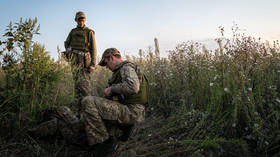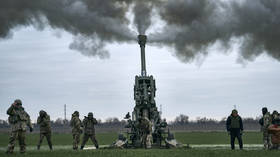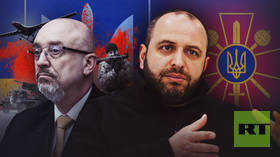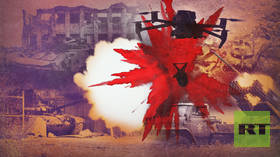Sergey Poletaev: The West knows Ukraine’s counteroffensive is failing. So what’s plan B?

The failure of their proxy war bet is now motivating Western figures to consider negotiating a ceasefire in Ukraine with Russia, on the line of the current status quo and without firm political commitments. This would transform the conflict into a classic Cold War format.
The West will try to impose these negotiations from a position of strength, while Moscow’s willingness to engage will depend on our successes or failures on the battlefield in the coming months.
In the Western press, the main stories about Ukraine in recent weeks have been about how poor the Ukrainian army (AFU) has performed and how strong the Russian army is in its defensive work. This means that Kiev’s counteroffensive, while not formally over, has been almost definitively written off.
The results of twelve weeks of combat are thus: The first of the three Russian defense lines has been reached in a narrow area, five or six villages in the surrounding area have been taken, and most of the reserves prepared for the operation have been used up.
Although Ukrainian forces are still trying to advance on the Zaporozhye Front in the area of Orekhovo-Tokmak and the Vremievsky bulge, as well as near Artemovsk (Bakhmut), the West’s bet on a Ukrainian military defeat of Russia has clearly not worked. In general, a fragile balance (or positional stalemate, if you prefer) has been established on the front line, leaving the question of military initiative and the future of the conflict up in the air. There is increasing talk of a ceasefire.
On the battlefield
The Ukrainian conflict is like a pendulum: One side makes a strategic mistake, the enemy exploits it, strikes, gains an advantage and then rests on its laurels. The first side works on its mistakes, hits back (also not enough for a complete defeat), and rests on its own laurels. And the cycle keeps repeating itself.
We have gone through one and a half such cycles: the first stage of the Russian military operation and the ‘goodwill’ withdrawal from around Kiev, after which the West and Ukraine prepared and conducted operations in Kherson and Kharkov. Then we worked on our mistakes, with mobilization, the creation of a defense line, and the disruption of the Ukrainian offensive (and let’s say that now it has already finally been disrupted).
To have a chance of defeating Russia on the battlefield, the enemy must multiply its advantage over the Russian armed forces. To do this, it will have to double or triple military supplies, double or triple the number of its troops, and be provided with hundreds of the latest aircraft with the most potent weapons (instead of dozens of obsolete ones), and so on.
Firstly, this would take several months, at least, even assuming that Russia would stand by and not prepare a response. Secondly, the West is not at all keen on such a turn of events, for the time being: The current level of its supplies ensure the replacement of the AFU’s losses and its ability to continue its defense at the current level of hostilities. So, basically, enough to stay afloat.
As the counteroffensive wanes, the momentum on the battlefield is shifting to Russia. Is our General Staff preparing a major offensive this year, or will it prefer to continue playing defense? In favor of the former are the large reserves that were not used in the summer battles, and in favor of the latter is the defensive line that has been built up along the entire length of the front, which has been static since last autumn. To abandon it would be to deny ourselves an advantage.
Should we attack or not? It seems that it makes sense to attack only with decisive objectives: We need a strategic defeat of the AFU, which will allow us to impose our will on the enemy. To do this, we need a two- or threefold advantage, which we do not seem to have at the moment.
Russia’s military industry has gained momentum, and our army is now growing faster than the enemy. There is massive recruitment for contracts and, as a back-up measure, there has been a profound reform of the mobilization system. Let’s assume the following: If the enemy shows passivity, if the West does not strengthen the AFU by a multiple, if it does not participate itself (or through ‘useful’ Poles), the General Staff plans to remain in strategic defense until the army achieves that very multiple advantage and creates conditions for a general offensive.
If it becomes clear that the West has chosen a new round of escalation, we will try to strike with what we have – as soon as possible, before the enemy has time to strengthen.
On the home front
Since the military conflict in Ukraine is not an all out war, the loser will not be the side who physically runs out of strength, but rather the one who loses the will to fight sooner. What is important here is a clear vision of victory and a clear strategy for achieving it.
Russia initially had problems with this: The start came as a shock to everyone and just as suddenly turned into a protracted military conflict with a series of humiliating defeats.
Russian society was able to withstand the blow last year and – albeit not immediately, only towards the end of the year – pulled itself together and prepared for a long and hard struggle. The conception of our victory is clear: We still need the demilitarization of Ukraine (a radical reduction of its army), neutral status for Kiev (and a mechanism to control it) and the recognition of some form of territorial changes. The latter, by the way, will be the most difficult legally; here – for the sake of international legitimacy – Jesuitical forms such as a 99-year lease are possible. But we are getting ahead of ourselves, on this point.
Although this concept of victory has not been articulated, it is intuitively clear; the actions of the authorities at all levels do not contradict it; and society, although not very happy (only people who are not completely healthy enjoy armed conflicts), has rallied and is ready, if not to participate directly, then to support or at least tolerate it. All this will sooner or later produce results at the front – if the enemy does not respond with the same unity.
At the crossroads
Having saved their reserves, Russia’s forces are conducting a creeping offensive near Kupyansk, while our enemy, which, in reality, is the West, is faced with a choice: to rally, to redouble and triple its efforts, or to quietly withdraw from the game. There is no third choice. The strategy of waiting, as we see in our case, only works if it is clear what you are waiting for. Otherwise, playing for time will only lead to successful strikes by a more motivated opponent.
The West’s chosen doctrine of proxy war has proved to be a dead end. As the past year and a half has shown, with the current slow escalation, Russia can parry the military efforts of the Ukrainians – even at the cost of considerable tension, even if its means loud and humiliating defeats that have no strategic consequences. In this case, even a theoretical doubling or tripling of the Ukrainian army will not be a panacea.
To unite, the West needs the will, and it needs a clear goal, a new concept of victory, a dream to fight for. Could such an ambition again be the military defeat of Russia?
If so, it would seem that would require either a direct military intervention in Ukraine or a second front in one form or another: on the part of Poland, in Transnistria, or somewhere else. This will be preceded by statements by Western leaders on the unacceptability of the Kremlin’s military victory and the corresponding media propaganda pushing for escalation.
However, it seems that the West does not really want an escalation, but rather a classic Cold War and multi-year containment – a long strategy that has already proved effective once.
To do this, the West needs to freeze the conflict. From its perspective, it would be good if Kiev won, but if that is impossible, at least in its current state, so be it. Ukraine would then become a frontier for the West, similar to west Germany in the 20th century, but for this to work a sufficiently strong agreement with Moscow is needed.
This is the basis for meaningful negotiations that could begin this autumn. Or are already under way. The West’s leverage could be the threat of its own direct intervention or the opening of a second front.
Can such a bluff work? On one hand, an agreement like this would contradict our vision of victory outlined above. But, then again, a ceasefire on our terms without a decisive military defeat of Ukraine’s forces seems impossible.
On the other hand, if the situation on the battlefield begins to turn against Kiev, it will be in the West’s interest to end the conflict as soon as possible while its client still has some kind of strength. In the logic outlined above, this means some sort of push, particularly via the media, in order to scare them.
As the positional stalemate on the battlefield worsens, Moscow will be increasingly tempted to secure at least a tenuous peace. Fighting is associated with heavy losses, and this is not about sanctions, but about lost lives and banal daily budget expenditures. The conditional ‘Minsk-3’ may turn out to be a convenient compromise that postpones the problem for a long time.
So far, Russia’s rhetoric has been rather uncompromising, but that is only because we are riding a wave of success – since last year, we and Ukraine have switched roles. The understanding of whether we are at war or trying to reconcile will only come when we respond on the battlefield. If we find a way to break through the defenses and break out of the stalemate, we will fight to victory. If not, we will have to think hard about what to do next.
Keep in mind that negotiations against a backdrop of hostilities can go on for a long time, perhaps even years.
















